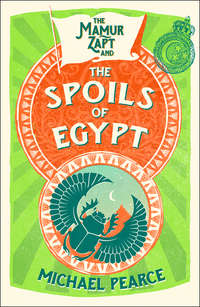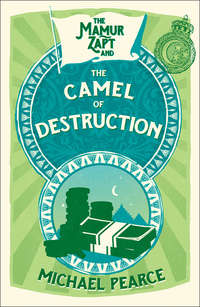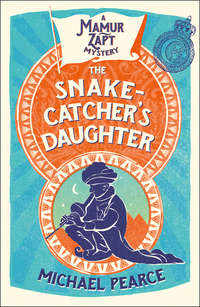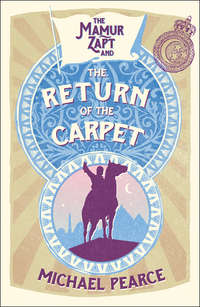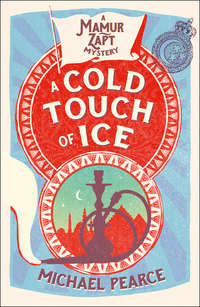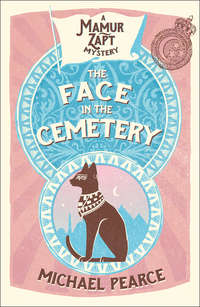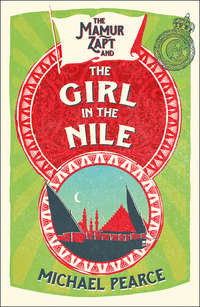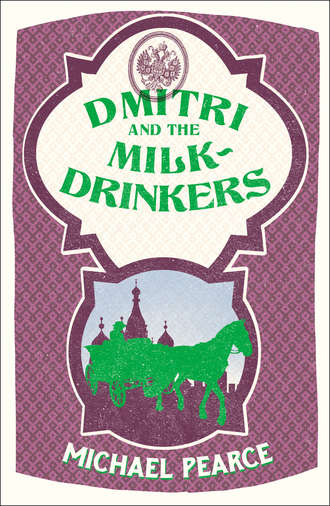
Полная версия
Dmitri and the Milk-Drinkers
‘Why did you ask me about politics?’
‘Because that could be the connection.’
‘You think she has run off to be a revolutionary?’ said Vera derisively.
‘Well, young people from good families do sometimes go off these days. Not to become a revolutionary but to work for a cause. Giving out literature, addressing meetings, organizing with others – ’
Vera Semeonova shook her head.
‘Anyone less likely to become a political activist than Anna Semeonova,’ she said firmly, ‘you never saw. For that kind of thing you require a degree of hardness, perhaps, even a degree of hate. Anna Semeonova wasn’t like that at all. She was a sweet, gentle girl, full of sympathy for others.’
‘All right,’ said Dmitri, ‘perhaps I’ve got it wrong. I don’t know the girl, I’ve hardly even spoken to her. Let me try something else on you; you said she was full of sympathy for others. Is it possible that she could have gone off in some daft quixotic way to work for the poor? In a monastery, perhaps – no, not monastery, her parents said she’d gone off the Church, but something like that?’
‘A sort of personal “Going to the People”?’ asked Vera, interested.
She was referring to the great movement of some years earlier which had sent hundreds of idealistic young people out into the countryside to work for the improvement of the poor; an initiative that the poor had not universally appreciated.
‘That sort of thing,’ said Dmitri, who had sided with the poor on this matter.
‘She said nothing to me,’ said Vera.
‘Oh, well …’
But Vera was thinking.
‘It’s a long shot,’ she said, pulling a prescription pad towards her, ‘but I can give you the name of a family. I mentioned them to her once – it was the last time she came – when we were talking about the way in which conditions contribute to infant mortality. You know, drunken father, ignorant mother, poverty, dirt, dozens of children already. Anna could hardly believe some of the examples I gave. She asked if there was anyone I knew whom she could go and see, so I told her about the Stichkovs. She wouldn’t come to any harm, the man is always unconscious and the woman is warm and kindly, quite motherly, really, in fact, far too much so – ’
Dmitri felt oppressed by the sheer fecundity. One babe was at Mrs Stichkov’s breast, two, hardly bigger, at her feet. Elsewhere in the room there appeared to be three more infants and there were certainly at least two outside. From time to time one of the children at her feet hauled himself up Mrs Stichkov’s skirt and applied himself to her free breast.
‘It’s food, after all,’ said Mrs Stichkov, ‘and there’s not much of that about with Ivan not working.’
Ivan was certainly not working. He was stretched on his back in a far corner of the room snoring loudly. Even at this distance, Dmitri could smell the vodka.
‘He doesn’t work much,’ Mrs Stichkov acknowledged.
Except, thought Dmitri, when he roused himself to perform his conjugal duties, which appeared to be pretty frequently.
‘Not since he’s hurt his back,’ supplemented Mrs Stichkov.
‘Ah, he’s hurt his back?’
‘Carrying the loads. He can’t carry a thing now. Not even the water. You need a man for that, the buckets are that heavy! Anna Semeonova tried to help me once, but she couldn’t even lift the pail, not when it was full. You need a man, really, and she’s just a slip of a girl.’
‘She tried to help you, did she?’
‘Yes, Your Excellency. She said, “It’s not right, not with you expecting and all.” But I said, “Lots of things are not right, and if I don’t do it, who will?” “I will,” she said, and she tried, but, bless her, she couldn’t even lift it. “You look after Vasya”, I said, “and I will do it.” “It’s not right,” she said, “not with your time so close,” and she just stood there. And then Marfa Nikolaevna came along and said, “No, it’s not right. That idle man of hers ought to do it, but he won’t lift a finger.” She’s got a sharp tongue, that woman has. “I’ll find someone, Mrs Stichkov,” she said. And off she goes and comes back with one of the men from her place. Mind you, he wasn’t that much better than Anna Semeonova, nor much bigger, neither, not with him being a Jew. Still, what do I care about that. I said to Ivan, “At least he gave me a hand, which is more than can be said for some people – ”’
Mrs Stichkov shifted the baby from one breast to the other, gently detaching the other child as she did so.
‘– And then he gives me a cuff!’ she said cheerfully. ‘I don’t mind, it’s not much of one – he can hardly stand up, he’s that drunk – but Anna Semeonova gets very angry. I can see she’s going to say something, so I say quickly: “Don’t mind him, love, it’s just his way!” But she doesn’t like it, I can see that, and she goes out, and a little later I hear her talking to Marfa Nikolaevna. Which is all very well, I’m not saying that the woman is wrong, but you have to watch out with her. Sometimes it’s better to let things rest easy. But she won’t, you see, she’s always got to out with it, and when it’s man and wife, it doesn’t pay to meddle.’
Over in the corner, Ivan moved loudly. Mrs Stichkov looked at him lovingly.
‘You don’t always know what a marriage is like,’ she said, ‘not from outside. Especially not if you’re a single woman. “What does she know about it?” I say to Anna Semeonova. But Anna Semeonova stands there cold and unforgiving. “You’re too forgiving, Mrs Stichkov,” she says. “Sometimes those outside can see better.” But then, she’s another, isn’t she? Single?’
‘I believe so,’ said Dmitri.
‘She won’t be for long,’ said Mrs Stichkov. ‘Not a girl like her. So pretty! A real Russian! And rich, too. Or so Ivan says. “Stay on the right side of her,” he says, “and it’ll be worth a rouble or two.”’
‘She’s never said anything about having a boyfriend, has she?’ said Dmitri, still diligent to eliminate options.
‘Boyfriend?’ Mrs Stichkov chuckled. ‘She’s not found out yet what it is men carry inside their trousers! A real innocent! “And it’s best if she stays like that,” I said to Marfa Nikolaevna, “so don’t you go putting any of your ideas in her head!”’
‘What sort of ideas?’ said Dmitri.
Mrs Stichkov looked vague.
‘Ideas,’ she said.
Dmitri tried again.
‘This Marfa Nikolaevna,’ he said, ‘what sort of woman is she?’
‘She’s got a sharp tongue. Everyone knows that! There’s hardly anyone who’s not felt the rough edge of her tongue at some time or another. That’s why it is no one will have her. And that, of course, only makes her sharper. “It’d be a blessing,” I say to Ivan, “if some man would take that girl down in the fields some time.” “Well, no one’s going to do that,” says Ivan, “not unless it’s one of her own kind.” You’d think one of them would, wouldn’t you? She’s not bad-looking.’
‘What are these ideas you say she has?’
‘It’s not ideas,’ said Mrs Stichkov, ‘it’s what she says!’
‘And what does she say?’
‘Oh, about the land and all that.’
‘What about the land?’
‘She says it oughtn’t to be owned by anyone. “You can’t have that,” I said, “that’s silly. You can’t just leave it lying around!” “No, no,” she says, “that’s not it. Everyone would own it together, it would belong to everybody.” “The peasants wouldn’t like that,” says Ivan. “They think it should all belong to them.” “That’s because they don’t know any better,” she says. “Well, you go and tell them that,” says Ivan, “and see where it gets you!” “That’s just the trouble,” she says; “people won’t listen! And because they won’t listen, the rich can get away with anything.” “You want to watch that kind of talk, my girl,” says Ivan, “or else you’ll be in trouble.” So then she shuts up, she knows she’s gone a bit too far.’
‘Was that the kind of thing she was talking about with Anna Semeonova?’
‘She just talks,’ said Mrs Stichkov. ‘Out it all comes! Just like mother’s milk,’ she said, looking fondly down at the baby, now replete and blotto on its mother’s lap.
The houses were on the edge of town and just beyond them were open fields, still white with snow, and occasional clumps of birch trees, their branches heavy with ice. Dmitri contemplated the prospect and shuddered. Not for him the great open space of Russia, the steppe that poets sang about; for him the great open boulevards of St Petersburg, and that was exactly where he meant to be as soon as he could escape from this dump.
Back up to his left was a tanner’s yard and the smell of the yard hung over the whole area. The acrid fumes irritated his eyes and caught at his chest in a way that he did not understand until he saw the empty drums piled at the tannery gates. Chemicals were used in the yard’s processes. Little yellow rivulets ran down from the yard into the fields, colliding on the frozen surface of a small stream. Further along the stream the ice was broken and ducks, strangely discoloured, were swimming. Further along still, two women were filling pails to take up to their houses. Was this where Mrs Stichkov came to fetch her water? Where Anna Semeonova had tried to help her?
Of an impulse he went over to the two women. They put down their pails and watched him approach: a visitor from Mars.
‘I wonder if you could help me,’ he said, saluting them. ‘I’m trying to find Marfa Nikolaevna’s.’
They looked at him rather oddly. Then one of them gathered herself.
‘The tailor’s is over there,’ she said, pointing.
‘Thank you.’
He looked down at the pails. The water in them was yellowish. And, now he came to look at it, everything was yellowish. The mud was yellowish, his boots were yellowish, the broken ice on the stream was yellowish, a duck clambered out and waddled towards him and that, too, damn it, was yellowish on its underfeathers.
‘This water is not fit for drinking,’ he said sternly.
The women shrugged.
‘It’s all the water there is, Your Honour,’ said one of them.
‘You should go up beyond the yard,’ he said.
‘It’s much further,’ said one of the women quietly.
‘You should think of your children!’
‘Lev Petrovich should think of our children,’ said one of the women bitterly.
‘Lev Petrovich?’
‘He owns the yard.’
‘Someone should speak to him.’
‘Marfa Nikolaevna did,’ said the woman, ‘and see where it got her!’
‘I will speak to him.’
‘Thank you, Your Honour,’ said the other woman. ‘That may help.’
‘It won’t help,’ said the first woman dismissively. ‘He’ll just take it out on us. Thank you, Your Honour,’ she said to Dmitri. ‘It’s kindly meant, I know, but sometimes it’s best to leave things alone.’
‘Well, I’ll see … and this Marfa Nikolaevna, you say, went to see him?’
‘Yes, Your Honour.’
‘And got nowhere?’
‘She speaks too bitter,’ said the second woman.
The other woman turned on her.
‘Not this time. She spoke real civil. Agafa Sirkova was listening at the door and she said she couldn’t get over how polite she was. Not that it made any difference. He threw her out just the same.’
‘Her reputation went before her,’ said the second woman. ‘That was the trouble.’
‘It would have been the same whoever had gone.’
‘Well, that’s very true, and that’s why it’s best to leave these things alone, as you yourself were saying to this gentleman only just now.’
‘But Marfa Nikolaevna, I gather, was not one to leave things alone?’ said Dmitri.
The first woman gave a little laugh.
‘You could say that,’ she said. ‘Yes, you could certainly say that! She was a bit of a firebrand. She wasn’t one of us, Your Honour. She came from the steppes. Those Tatars, they light up at anything.’
‘Well,’ said Dmitri, ‘all this is not really my concern. I am hoping she might be able to help me on something else. The tailor’s, you say?’
As he left, he was aware again that they were looking at him rather oddly.
The snow on this side of the stream, between the houses, had become a sea of mud, through which his boots squelched noisily. Great, discoloured puddles lay everywhere. Half in one of them, half out, he could see a rat lying on its back, its body still and contorted, its feet in the air, the underside of its belly tinged with yellow. The fumes from the tannery made him cough and reach for his handkerchief. This was definitely not the place for a young woman like Anna Semeonova; nor, frankly, was it much of a place for a promising young Examining Magistrate.
Dmitri pushed open the door and went in. The room was full of women sewing. It was so dark that he was amazed that any of them could see.
‘I’m looking for Marfa Nikolaevna,’ he said.
A man in a skull cap came forward.
‘Marfa Nikolaevna?’ he said, with a worried expression on his face. ‘But, Barin, she is no longer here.’
‘No longer here?’
‘She hasn’t been here for, oh, over three weeks now. Not since they came and took her away.’
‘Where is she now?’ said Dmitri harshly.
‘Her case came up yesterday,’ said the tailor, ‘in the District Court at Kursk.’
3
The following morning, Anna Semeonova had still not been found.
‘It’s bad,’ said Peter Ivanovich. ‘First, because she’s a nice girl. I’ve known her since she was six. At that time she looked like a dumpling and everyone was afraid she was going to take after her father. Recently, though, she has thinned out and is becoming a beauty like her mother. Second, because her father blames us. Thirdly, because so does everyone else.’
Dmitri was always irritated by the Presiding Judge’s pedantic habit of enumerating his points.
‘She did, after all, disappear from the Court House,’ he pointed out.
‘I know; very inconsiderate of her,’ said Peter Ivanovich. ‘Why couldn’t she have disappeared from her home? We would still have been blamed, but we wouldn’t have looked quite as stupid. And now I’m afraid they will send someone down from St Petersburg.’
‘To take charge of the case?’
Dmitri wasn’t sure that he liked this. It was his case; and thus far in his career he had not been assigned so many that he could afford to be blasé. This was, actually, if you included the ridiculous affair of the old woman and the cow, only his second case. And were they now going to take even that from him?
‘We must resist,’ he said sternly.
Peter Ivanovich looked at him pityingly.
‘Tell me how you get on’, he said, ‘as Examining Magistrate in Siberia. Let me talk to you as a father, Dmitri Alexandrovich: obstruct, but do not resist. That is the first rule of bureaucracy. Besides,’ he said, ‘they won’t take over the case. They will leave you in charge. So that you can be blamed if things go wrong. That is the second rule of bureaucracy: make sure that responsibility always lies elsewhere.’
The advice of a master, thought Dmitri. Peter Ivanovich was wrong, however. The first rule of bureaucracy was surely to keep your mouth shut; which Dmitri was grimly trying to do.
‘The answer is, of course,’ continued Peter Ivanovich, ‘to solve the case yourself before they get here. How are you getting on, incidentally?’
He listened to Dmitri’s account of yesterday’s inquiries.
‘Interesting,’ he commented. ‘Who would have thought it? A girl like Anna Semeonova – getting herself mixed up with such people!’
‘I’m not sure how far she is mixed up with such people,’ said Dmitri. ‘That’s one of the things I wanted to ask Marfa Nikolaevna.’
‘Ask her, by all means,’ said Peter Ivanovich generously, ‘although I doubt if it will help you much.’
‘I would if I could,’ said Dmitri, frowning. ‘But there’s been a bit of a mix-up.’
‘Another one?’ said Peter Ivanovich. ‘Oh dear! These people! What is it this time?’
‘They can’t trace her.’
‘Come, come!’ said Peter Ivanovich. ‘She was in court the day before yesterday, wasn’t she? And surely she was not acquitted?’
‘Oh, no. She was sentenced, all right. It’s what happened afterwards that’s not clear.’
‘It’s as clear as daylight,’ said Peter Ivanovich. ‘She was a political prisoner, wasn’t she? Then she would have been sent back to prison to await transportation.’
‘So one would have thought. But the prison denies readmitting her. And there’s a complication. Some of the prisoners that day were sent directly to join the Siberian convoy.’
‘Well, perhaps that’s what happened to her, then,’ said Peter Ivanovich patiently.
‘They’ve checked the lists,’ said Dmitri, ‘and they can’t find her.’
‘They’ve made a mistake. It’s always happening. A clerical error. Either there or at the prison. Get them to check it again!’
‘I have. There’s no record in either place of a person of that name.’
‘There must be! She must be either in the one place or in the other. Either in prison or in the convoy. She can’t be still in the Court House, can she?’
‘Well, no.’
‘I mean, you’ve searched the place thoroughly, haven’t you? For that other girl?’
‘Novikov has searched the place,’ said Dmitri, learning fast. ‘Thoroughly, he says.’
‘Well, then!’
‘So she must be either in the prison or with the convoy. Unless …’
‘Yes?’
‘She’s disappeared. Like the other one,’ said Dmitri with emphasis.
‘Oh, my God!’ said Peter Ivanovich, clapping his hands to his head.
‘If this woman has indeed disappeared,’ said Peter Ivanovich coldly, ‘I hold you responsible.’
‘Me, Your Honour?’
The Chief of Police reeled back.
‘You’re responsible for security arrangements, aren’t you?’
‘Only in the Court House, Your Excellency! Only in the Court House!’
‘But that’s where she’s disappeared from.’
‘Ah, but did she, Your Honour?’ said Novikov, recovering quickly. ‘Did she? Perhaps she escaped as the carts were going back to the prison – ’
‘She’s not on the carts list,’ said Dmitri.
‘Or from the convoy – ’
‘She’s not on their list, either.’
‘She must be! She must be!’
‘What are these lists?’ asked Peter Ivanovich.
‘At the end of the sessions the Clerk of the Court prepares a list of all those sentenced,’ said Dmitri. ‘From it, an assistant clerk compiles two separate lists, one for the officer in charge of the prison carts, one for the officer in charge of the convoy. The prisoners are assembled in the yard and assigned to one set of carts or the other on the basis of the consolidated list. As they get to the carts their names are checked against those on the separate lists. Marfa Nikolaevna’s name appears on the consolidated list, but not, so far as I can tell, and I’ve asked both the Prison Administration and the Convoy Administration, on either of the separate lists.’
‘They must have made a mistake,’ said Novikov.
‘Exactly what I said!’ said Peter Ivanovich.
‘I got them to check,’ said Dmitri.
‘Ah, yes, Your Honour, but it will be different if I ask them. Saving Your Honour’s presence, but they won’t have bothered much for someone new like yourself. Let me have a word with them, Your Excellency,’ said Novikov, turning to Peter Ivanovich, ‘and I’ll soon sort this out.’
‘Do so; and don’t take too long about it, either. One can’t have people disappearing from the Court House. Really, one begins to feel quite nervous!’
Novikov returned, beaming, before the lawyers had finished their lunch.
‘There you are, sir, what did I tell you? Sorted it out in no time! A simple mistake, sir, as you supposed.’
He put a piece of paper on the table before Peter Ivanovich and smoothed it flat.
‘There you are, Your Excellency!’ He pointed with a stubby forefinger. ‘That’s what you want!’
Peter Ivanovich adjusted his pince-nez.
‘Is it?’
‘I know, sir. You’re having difficulty. And not just you alone, sir. Everyone else. That’s how the misunderstanding arose. No one’s fault, sir, except for that fat clerk who’ll be feeling the toe of my boot up his fundament if he doesn’t take more pains next time.’
Peter Ivanovich looked again.
‘I suppose you’re right,’ he said doubtfully.
‘Not convinced, Your Excellency?’ Novikov chuckled. ‘Well, that doesn’t surprise me. In fact, it’s what I told myself. An old fox like His Excellency will want something more than that, I said. And quite right, too! So I did a bit of nosing around and, as luck would have it, who should I come upon but young Stenka. Come in, lad!’ he called out into the corridor.
A fresh-faced young soldier appeared hesitantly in the doorway.
‘Come in, lad. His Excellency won’t bite you. Now, you come in and tell His Excellency what you told me.’
The young soldier cleared his throat nervously.
‘I was on the carts,’ he began.
‘That very afternoon,’ interjected Novikov.
‘Yes, right, that afternoon. The women’s cart, as it fell out. Well, I don’t mind that, I mean, you never know what you might see, and you’re not going to have any trouble, are you? I mean, not any real trouble. They say things, of course, you’ve got to put up with that, but I know how to handle that. I just say: “You bloody shut up or you’ll taste the butt of my gun!”’
‘The cart, lad, the cart,’ put in Novikov hastily.
‘Yes, right, the cart. Well, there weren’t many of them that afternoon, not women, I mean. Only a few for us. So I’ve got a bit of time, and I see this girl. A real Russian beauty, she is. Oh ho, I think, I’ll bet you’ve got a nice pair of apples, and I give her a pinch as she goes by. Well, she jumps about half a verst. “What’s your name my beauty?” I say. She doesn’t answer, so I go to the sergeant and I say: “See that one there? What’s her name?” “What do you want to know for?” he says. “A taste comes before a feast,” I say. “Well,” he says, “there’s not going to be much of a feast for you, my lad, because she’s going straight on to the main convoy and you’re going to be stopping here.” “Never mind that,” I say. “What’s her name?” He looks at his list. “Shumin,” he says. “Marfa Nikolaevna Shumin.”’
‘Shumin?’ said Peter Ivanovich. ‘You’re sure about that?’
‘Pretty sure, sir. But I’m dead sure about the “Marfa”. My own sister’s named Marfa, it’s a bit of a family name. “That’s a good omen,” I said to myself. “She’s almost one of the family, like.”’
Novikov looked at Peter Ivanovich.
‘Satisfied, sir?’
‘There seems no doubt about it,’ Peter Ivanovich conceded.
‘That’s what I thought, sir, once I’d talked to Stenka. The name by itself, I said, won’t be enough to convince Peter Ivanovich. But a witness, an honest witness – well, that’s a different matter!’
‘Happy, now?’ said Peter Ivanovich, looking at Dmitri.
‘Not very.’ Something was troubling him. In what the guard had said. He dismissed it for the moment. ‘This was the convoy, was it?’ he said to Stenka. The soldier nodded. ‘That means she’s halfway to Siberia by now. How am I going to question her?’
‘Not very easily,’ said Peter Ivanovich. ‘Unless you care to go after her.’
Novikov gave a great guffaw.
‘That’s a good one!’ he said, nudging Stenka. The soldier, not entirely understanding, but dutiful, joined in.
Peter Ivanovich allowed himself a slight smile.
‘I’m afraid our young colleague is one for the psychological,’ he said.
‘Psychological, Your Excellency?’
‘It’s the latest fashion in the Law Schools. These days, Grigori Romanovich, we mustn’t just look at the facts, we must look at the motives behind the facts.’
‘It’s getting a bit deep for me, sir.’
‘Me, too. If a dog bites a man, why ask for its motive?’
‘Why, indeed, Your Excellency?’ said Novikov, guffawing again.
‘Not only motives,’ said Dmitri, ‘but circumstances.’
It was coming to him now. Not just in what Stenka had said, but in what the women at the tannery had said.
‘Ah, circumstances!’ said Peter Ivanovich.
‘What circumstances are there, then, Dmitri Alexandrovich?’ said Novikov, mock innocently. ‘Finding out how it is that someone can’t read someone else’s writing?’


